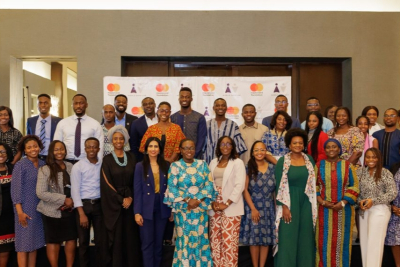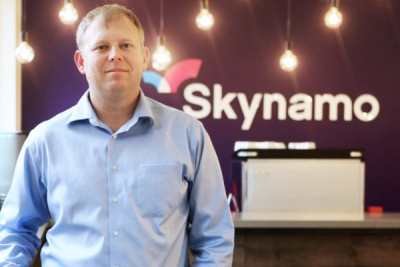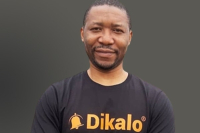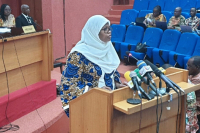BotswanaPost, has partnered with Software Group -a global technology company specialized in digitalization and integration solutions for financial service providers- to introduce DigiPost, Software Group announced June 4.
This solution, which will be an integral part of the BotswanaPost Posa'it super app, will enable individuals and small businesses to resell postal services, improving financial inclusion across the country.
Modernizing the administration to improve efficiency and equip it for the challenges of the new economy is a key focus for Senegal's President, Bassirou Diomaye Faye. President Faye is committed to implementing reforms that will optimize governmental effectiveness in this vital area.
Senegal Numérique SA (Sénum SA), the state-run agency responsible for managing Senegal's digital infrastructure, has a new leader. Isidore Diouf (pictured right) took the helm on Friday, June 7, succeeding Cheikh Bakhoum (pictured center) who served for nearly a decade (9 years, 11 months).
Diouf, tasked with executing President Bassirou Diomaye Faye's digital policy, outlined his strategic vision. He views digital technology as an engine for development across various sectors, including economic, industrial, healthcare, and education. He positions Sénégal Numérique, designated a "strategic state enterprise," as central to this transformation.
Diouf identified key elements for success: building robust and secure digital infrastructure, acting as a central hub to coordinate government digital programs, fostering collaboration with Information Systems Departments (DSI) within the government, and establishing strong partnerships with stakeholders in the digital space.
Diouf will build upon the accomplishments of his predecessor, Bakhoum, whose initiatives have positioned Senegal as a leader in the West African digital landscape. Notable achievements include the Smart Senegal project, the deployment of nearly 4,400 kilometers of fiber optic cable, the SHARE submarine cable, the construction of the national data center in Diamniadio (commissioned in 2021), and the digitization of numerous administrative procedures.
The new director's focus is on bridging the digital divide within Senegal and diversifying state revenue. According to official 2021 statistics, the digital economy currently contributes about 3.3% to GDP, while internet penetration sits at roughly 46%. The Sénégal Numérique 2025 (SN2025) strategy aims to increase the digital economy's share of GDP to 10%.
Samira Njoya
Access to detailed employment data enables targeted interventions to address critical issues such as high youth unemployment, poverty, and limited economic diversification.The initiative aligns with Africa's broader goals of leveraging technology and education to foster inclusive growth.
World Data Lab, in partnership with Mastercard Foundation, launched the Africa Youth Employment Clock in Ghana, World data lab announced on June 12. This innovative tool offers real-time data on job growth, providing critical insights into employment trends and opportunities for Africa's youth.
“The Africa Youth Employment Clock is a first of its kind providing consistent, comparable labour market statistics forecasting till 2030 for youth employment in Africa. Our aim is to ensure that decision makers are equipped with the right information to effect change for the youngest workforce in the world. We are proud to be partnering with the Mastercard Foundation to shape a better understanding of youth employment.” said Vice President Strategic Engagements, World Data Lab Dr. Reshma Sheoraj.
Since its inception, the Africa Youth Employment Clock has been pivotal in fostering discussions and actions to empower Africa's youth. Offering comprehensive data for all 54 African states and detailed sub-national data for Ghana, Kenya, and Rwanda, it serves policymakers, stakeholders, and advocates focused on youth empowerment and economic development. More than a data tool, it provides actionable insights, enabling informed decisions and impactful strategies to address unemployment, poverty, and economic diversification challenges.
Mastercard highlights a significant gap between the number of young people seeking employment and the limited opportunities available. In sub-Saharan Africa, 18 million jobs need to be created annually to absorb new labor market entrants, yet only 3 million formal jobs are currently being generated, as revealed by the African-Europe Foundation in its 2022 report on Migration and Mobility.
To address this, the Mastercard Foundation aims to help 30 million young Africans secure dignified work by 2030. This goal aligns with initiatives like the Africa Youth Employment Clock, which democratizes data and informs decisions in public and private sectors. Additionally, the foundation supports the Youth Forward Initiative, connecting youth to jobs in construction and agriculture, and the Youth Think Tank, which involves young people in researching and documenting community challenges and aspirations.
Hikmatu Bilali
In July 2023, Sonatel became the first Senegalese operator to acquire a 5G license in the country, for nearly $57 million. In March 2024, it announced the launch of ultra-high-speed commercial internet exclusively for residential and business customers.
Senegalese telecom company Sonatel (Orange) announced the launch of its 5G mobile offers on Saturday, June 8. The operator promises its subscribers "instant download and streaming speeds, as well as increased responsiveness for real-time applications such as online gaming, virtual reality, telemedicine, e-education, and many others."
To access the service, Sonatel subscribers will need 5G-compatible devices and must be in areas already covered by the network. Sonatel's 5G network currently covers the cities of Dakar, Thiès, Saint-Louis, Diourbel, Kaolack, and Louga, with 176 sites deployed. The company plans to extend the next-generation mobile network coverage to the entire Dakar region by the end of 2024.
In March, Sonatel announced the launch of commercial 5G services in Senegal, nearly simultaneously with its competitor Saga Africa Holding Limited (Free). However, the initial offers from the historic operator were limited to fixed 5G for residential and business customers. On May 21, Sékou Dramé, the company's CEO, announced the launch of commercial 5G mobile offers for June 1.
The launch of Sonatel's 5G mobile service is expected to democratize the service in a Senegalese telecom market dominated by mobile consumers. It should also help the company strengthen its market-leading position, particularly in the Internet segment. Sonatel claims the status of "first 5G operator in Senegal and, to date, the only one offering 5G services."
According to data from the Regulatory Authority for Telecommunications and Posts (ARTP), Sonatel held a 65.2% share of the Internet market with 19.8 million subscribers as of December 31, 2023. In the mobile phone market, the operator had 12.6 million subscribers, representing a market share of 56.4%.
Isaac K. Kassouwi
With the release of the second version of its mobile app in June 2024, the fintech company Zepargn is making significant strides in its growth process. The company aims to launch new features and offer additional products to its users.
Zepargn is a fintech solution developed by a young startup from Benin, allowing users to save money by setting financial goals. Founded in 2023 by Alao Lawal, this Cotonou-based startup aims to democratize access to financial services, enabling individuals to manage and optimize their savings easily and securely, regardless of their banking status.
"Zepargn is a financial companion designed to help you achieve your dreams. It allows you to set personalized savings goals, whether for a major purchase, a dream vacation, or an emergency fund. Zepargn automates the savings process, sends reminders, and tracks your progress, making it easier to realize your financial aspirations," explains the startup.
The mobile app is available on iOS and Android and has already been downloaded over a hundred times. To access the company's various services, users must download the app and create an account in just a few clicks. They then configure a savings goal and define the parameters. After this setup, users can start making regular or one-time deposits from their bank cards or mobile money accounts.
From the dashboard, users can track their savings progress with various tools provided by the startup. This allows them to know their status at any point in their savings journey. Alao Lawal told We Are Tech Africa that Zepargn has over 1,500 active users and more than 15 million CFA Francs (24,370 USD) saved on the platform since its launch.
"However, to continue increasing adoption, we plan targeted awareness campaigns to educate the unbanked about the benefits of our solution, continuous improvement of the user experience based on feedback, and the launch of new attractive features and products such as interest-bearing and group savings and credit," he added.
The Beninese fintech is present in ten countries but aims to strengthen its presence in the West African sub-region. It plans to introduce a financial education feature with targeted content in a gamified format, expand its service offerings to other population segments, including small businesses, and establish strategic partnerships with financial and insurance institutions to offer diverse and tailored products to meet the population's needs.
Adoni Conrad Quenum
His goal is to boost the efficiency of companies' field sales teams. He offers mobile technologies that help them achieve their objectives.
Sam Clarke (photo) is the co-founder and CEO of Skynamo. Hailing from South Africa, he leverages technology to support the country's sales teams, providing them with the information, analytics, and freedom necessary to meet and exceed their companies' goals.
Founded in 2012, Skynamo offers a mobile sales app designed for manufacturers, wholesalers, and distributors employing field representatives. This app automates repetitive administrative tasks that slow down and bore salespeople, allowing them to save time, strengthen customer relationships, and increase sales.
Skynamo also provides business owners and sales managers with better control and greater transparency. With a real-time dashboard, they can monitor all field sales activities and analyze the results. The Skynamo app integrates with various ERP and accounting software, enabling sales representatives to access up-to-date information on prices, customers, and inventory even when they are on the road. The company manages nearly 500,000 client visits, 3 million customer relationships, 2 million products, and has recorded 130,000 orders worth over $70 million for its clients.
In addition to his role at Skynamo, Sam Clarke is an active philanthropist. He sits on the board of the Anna Foundation, an organization that supports underprivileged schools and communities by providing educational, social, and environmental support, as well as essential skills for children.
Clarke holds a master's degree in Computational Electromagnetics from Stellenbosch University, obtained in 2002, and a master's degree in Entrepreneurship from the University of Cape Town, earned in 2007. He has accumulated extensive professional experience working for various South African tech companies. From 2008 to 2012, he was the Managing Director of Magus, the first company he co-founded. Between 2015 and 2019, he served as a Non-Executive Director of Sazo Labs, specializing in virtual and augmented reality software development, and Alchemy-A, a business accelerator in the software and electronics sectors.
Melchior Koba
Alain Ekambi (photo) is a Cameroonian computer scientist and tech entrepreneur. As the co-founder and director of Dikalo, he designs technologies that enable people to connect with friends and family, find communities, and grow their businesses.
Founded in 2017 by Alain Ekambi, Daniel Agnéro, Bitoa Pedenkil, and Kate Awanka, Dikalo is a social network with a mission to become Africa's best. Its priority is to connect people while protecting their privacy. Dikalo also aims to stimulate business growth, create jobs, and strengthen the local economy. Through Hoka, its integrated mobile payment feature, Dikalo enables instant bankless money transfers and receptions.
"Dikalo focuses on Africa with features and services tailored to the continent and its people (stickers, Afro emojis, money transfers, e-commerce, etc.). We are authentically African, something WhatsApp will never be. We need our own communication tools because our revolution is more ideological than technological," said Alain Ekambi in 2019.
In 2014, Ekambi founded Ahomé Innovation Technologies with Togolese entrepreneur Elom Amouh. This consulting firm is based in Germany.
Alain Ekambi holds a degree in computer science, obtained in 2010 from Wilhem Büchner University. After his studies, he worked as a software architect at jambit, a German software services provider. Between 2010 and 2014, he was a software engineer at NTT Data Germany, an innovator in business and technology services.
Digitalization streamlines processes, reducing paperwork, time, and resources required for court proceedings. This efficiency can lead to faster resolution of cases, which is crucial for economic development as it enhances the ease of doing business and fosters investor confidence.
Zimbabwe’s Judicial Service Commission (JSC) has embarked on a campaign to digitalize magistrates courts nationwide, aiming to improve access to judicial information. The campaign was launched across all 10 provinces as the JSC marked its 14th anniversary on June 10.
Chief Magistrate Faith Mushure said, "Digitalization of the magistrates courts will begin on January 1, 2025. This is a critical step towards ensuring efficient, transparent, and accessible justice for all Zimbabweans."
Since its establishment in 2010, the JSC has aimed to provide easy access to courts and judicial services across Zimbabwe, particularly in marginalized areas.
In its DIGITAL ECONOMY FOR ZIMBABWE Country Diagnostic 2021 report, the World Bank reveals that Zimbabwe has the potential to establish a strong digital government, having laid the foundation for a digital ID system, core back-end systems, an accessible government portal, and innovative digital services. This development signals a shift towards modernization and efficiency within the country's governance structures.
Hikmatu Bilali
Africa's digital transformation is gaining momentum, and building a strong digital infrastructure is crucial to achieving the goals outlined in previous strategy documents.
Mauritania plans to install an additional 2,300 kilometers of optic fiber cable nationwide, Minister of Digital Transformation Mohamed Abdallahi Ould Louly announced on June 10th. The plan, unveiled at the launch of a fiber optic training program, aims to connect all wilayas and moughatas to fiber optic infrastructure.
This initiative is part of the Mauritanian government's Digital Agenda 2022-2025, which seeks to leverage digital technology as a catalyst for accelerating the country's socio-economic development. In May 2021, the government established a specialized ministry to oversee all projects related to this vision. Since then, the country has already implemented more than 5,500 kilometers of fiber optic cable as part of its efforts to improve digital infrastructure.
In addition to political will, this progress has been driven by various partnerships. Notable agreements include several partnerships with the United Arab Emirates and France, as well as prospects for enhanced cooperation in the digital sector with the United Nations. On April 2, the Mauritanian minister met with Leila Peters Yahya, the UN system's Resident Coordinator in Mauritania, in Nouakchott to discuss these collaborations.
Under its Digital Agenda 2022-2025, Mauritania planned to lay 4,000 kilometers of backbone infrastructure by 2025 and has outlined plans for an additional 4,000 kilometers in the coming years. The goal is to enhance Internet connectivity and access to international bandwidth, which are essential conditions for the development of e-government, the proliferation of startups, and the emergence of a technological ecosystem in the country.
Adoni Conrad Quenum
Digital transformation is a key focus of the development initiatives launched by the Burkinabé government. Ouagadougou aims to rely on World Bank assistance to successfully implement its digital strategy.
Burkina Faso is poised for a significant leap forward in its digital transformation journey. The Transitional Legislative Assembly (ALT) on Tuesday, June 11th, approved a $150 million loan from the World Bank's International Development Association (IDA) to fund the Digital Transformation Acceleration Project (PACTDIGITAL).
This ambitious project aims to bridge the digital divide in Burkina Faso by improving accessibility and adoption of digital services nationwide. The focus will be on reaching underserved areas, particularly rural communities, and marginalized groups.
"PACTDIGITAL will directly benefit a wide range of individuals," explained Minister of Digital Transition, Posts, and Electronic Communications, Aminata Zerbo/Sabane. "This includes women, youth, people with disabilities, internally displaced persons, and their host communities. Additionally, public employees - civil servants, teachers, and trainers - will gain valuable digital skills. The project also extends to private companies, formal and informal training institutions, local incubators, and associations. Notably, PACTDIGITAL covers the entire country, with security considerations factored in."
Building upon the successes of the West Africa Regional Communications Infrastructure Project (WARCIP - BF) and the e-Burkina project, PACTDIGITAL will serve as a springboard for further digital initiatives in Burkina Faso. The IDA funding is a critical step towards closing the country's significant digital divide. Official figures show a low mobile connectivity index of 26.2 in 2018. Additionally, 3G and 4G mobile network coverage rates remain low compared to neighboring countries, sitting at 64.3% and 41.5% respectively in 2022.
Samira Njoya
More...
In 2021, Zambia recorded over 10 million cyberattacks, while losses for the financial sector were estimated at approximately $5.6 million between 2020 and the second quarter of 2022, according to the government.
In Zambia, a court has sentenced 22 Chinese nationals and a Cameroonian to prison terms ranging from seven to eleven years, along with fines for cybercrime, as reported by AP News on Saturday, June 8.
These convictions follow a series of investigations that began after a surge in computer fraud cases. Many victims reported unexplained losses of money from their mobile phones and bank accounts. The convicted individuals were part of an Internet fraud network, dismantled last April, which comprised 77 members, mostly Zambians. During the raid that led to their arrest, authorities seized over 13,000 SIM cards, firearms, and ammunition. The online scams orchestrated by this network primarily targeted Zambians, as well as individuals in Singapore, Peru, and the United Arab Emirates.
According to government data, Zambia recorded 10,718,002 cyberattacks in 2021. Also, the financial sector lost more than 150 million kwachas ($5.6 million) between 2020 and the second quarter of 2022.
In 2021, the country enacted the Cybersecurity and Cybercrimes Act, which aims to protect people online, especially children, and to facilitate the identification, reporting, and protection of critical information infrastructures.
Meanwile, the country ranked 10th in Africa and 73rd globally in the Global Cybersecurity Index (GCI) 2020 with a score of 68.88%.
Charlène N’dimon
Jumia, which achieved unicorn status in 2016, has established itself as a leader in the African ecommerce sector. The startup is setting its sights on further growth in Nigeria and Morocco.
Last week, e-commerce platform Jumia announced the opening of two new integrated warehouses in Lagos, Nigeria, and Casablanca, Morocco, aiming to bolster future growth and meet rising demand across the continent.
The Casablanca facility spans 5,000 square meters and will house over 300,000 products. Jumia, which became Africa's first unicorn startup (valued over $1 billion) in 2016, did not disclose details on the capacity of the larger 30,000-square-meter Lagos warehouse.
This expansion aligns with Jumia's strategy to solidify its position as Africa's e-commerce leader. Following its 2016 unicorn status, Jumia made strategic adjustments, including exiting the Jumia Food venture in 2023 due to operational and macroeconomic challenges across its seven markets.
The new warehouses are expected to significantly enhance operations in both Nigeria and Morocco, leading to improved efficiency, cost savings, and faster delivery times. Notably, Partech Africa data shows a 53.29% decline in African e-commerce startup funding in 2023 compared to 2022, reaching $298 million.
Adoni Conrad Quenum
A seasoned serial entrepreneur with extensive experience in technology, he leads an incubator that helps young Congolese become successful tech entrepreneurs.
Jean-François (Max) Bonbhel (photo) is a Congolese entrepreneur. As the founder and CEO of Yekolab, he provides startup incubation services and supports young Congolese tech entrepreneurs.
Founded in 2014, Yekolab is both a startup incubator and a center of excellence for training in new technologies and emerging professions. By leveraging the power of ICT, it promotes innovation, entrepreneurship, and job creation in Congo and across Africa.
In addition to incubation, Yekolab selects and mentors promising tech entrepreneurs, enhancing their technical and managerial skills. The incubator also offers acceleration services to local and regional SMEs, focusing on technology to help them increase their market share and become leaders in their respective fields.
Max Bonbhel is also the founder and president of Africa Java User Groups, a coordination network for Java programming language user groups in Africa. Furthermore, he founded and leads JCertif International, an organization established in 2009 that provides free training materials and speakers, and fosters collaboration among technology user groups on the African continent.
Since 2011, Max Bonbhel has worked as a freelance technical writer for Oracle. He is also a co-founder and the CTO of Access EMI, a U.S.-based company established in 2014 that connects tech businesses with tech communities.
An alumnus of Evry Paris-Saclay University, where he studied from 2000 to 2002, Bonbhel worked for several years at Fujitsu Canada. From 2004 to 2014, he served as a Java consultant, trainer, and project manager.
Melchior Koba
From July 5 to 7, the Dakar City Hall will host a hackathon for technology enthusiasts. Called Dakar Innovation Days, this event will showcase the creativity of students, professionals, and hobbyists. Organized by the Dakar City Council, the initiative aims to identify and promote innovative start-ups that contribute to local development.















